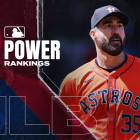
Roki Sasaki, the precocious ace of Japan's Chiba Lotte Marines, will not be posted for the consideration of Major League Baseball teams. Sasaki, who had reportedly requested the Marines allow him to pursue a transfer to MLB this winter, was not submitted ahead of the Dec. 15 deadline. His future availability will continue to be a mystery.
Sasaki, 22, made global headlines in 2022 when he struck out 19 batters in a perfect game. Although he was limited by injury to 15 appearances last season, he nevertheless accumulated a 1.78 ERA and 135 strikeouts in 91 innings. For his Nippon Professional Baseball league career, he now possesses a 1.90 ERA and a 6.69 strikeout-to-walk ratio.
The Marines and Sasaki both have financial incentive for him to remain overseas for several more years. Under MLB's current rules, Sasaki would be classified an amateur free agent because of his age and lack of experience. That means he would not be allowed to sign for more than what a team possessed in international bonus pool money. In turn, that would limit the Marines' posting fee, costing them millions upon millions of dollars compared to what they would fetch if Sasaki remained in Japan until the winter of 2026.
Veteran journalist Jim Allen recently broke it down:
A $300 million contract for Sasaki would net Lotte $40,625,000, while a minor-league contract would earn Lotte a fee worth one quarter of say a $3,500,000 signing bonus and a salary of say $20,000 or as much as around $880,000 for one of the top players in Japan.
Jorge Castillo and Jack Harris of the Los Angeles Times reported in November that Sasaki was believed to have an opt-out clause of sorts that allowed him to be posted whenever he desired. Given recent events, it's unclear if Sasaki does have that power, or what restrictions are placed on it.
Sasaki's exact timeline to join MLB, then, remains anyone's guess. He could make his way over as soon as next winter -- if he has the aforementioned clause and/or the Marines relent. If Sasaki doesn't have that clause in his contract, and it's solely up to the Marines, then Sasaki may have to wait until after the 2026 season.
Sasaki himself has financial incentive to wait. For an example of how those restrictions limit a player's earning potential, consider that Shohei Ohtani made the league minimum in each of his first three seasons and signed for a bonus of just $2.3 million. (The Nippon Ham Fighters, Ohtani's team, received a $20 million signing bonus under the old Collective Bargaining Agreement.)
Here's the breakdown of posting fees based on contract value:
- Contract worth less than $25 million: 20% of contract value
- Contract worth $25 million to $50 million: $5 million plus 17.5% of amount over $25 million
- Contract worth more than $50 million: $9.275 million plus 15% of amount over $50 million
Of course, money isn't always the main motivation from a player perspective, as Ohtani proved and Sasaki could in time. And, if the Marines truly have to abide by a clause in Sasaki's contract, they too might have to settle for less than their optimal financial return. For now, Sasaki's availability will remain shrouded.
Whenever Sasaki makes his way to MLB, he's expected to be a highly desired free agent. He's dominated NPB batters thanks to an upper-90s fastball and a trapdoor splitter.






















